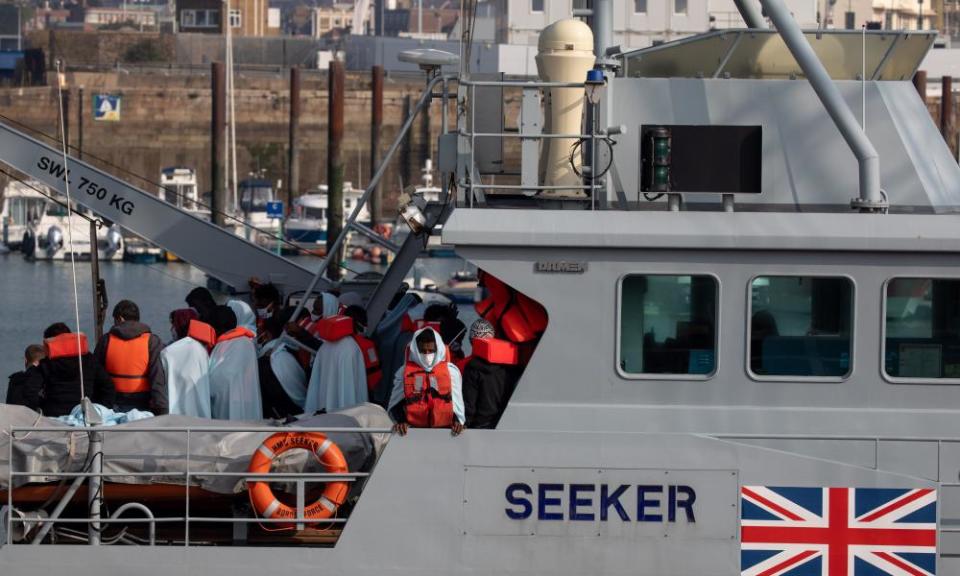Asylum seekers crossing Channel face 'inhumane treatment', observers say

Asylum seekers who have crossed the Channel in small boats are being subjected to “inhumane treatment”, independent monitors have said, with individuals moved between detention centres with untreated broken bones, burns and cancer.
Evidence collated by four separate independent monitoring boards, which scrutinise prisons and immigration detention facilities, found that people arriving at Dover were being kept in crowded conditions – with no social distancing – and that serious errors were being included in their documentation.
The bodies examined the process those arriving on small boats go through – from the moment they disembark in Dover from a dinghy, through attending different immigration detention centres, to being put on a plane back to the EU country they passed through before arriving in the UK.
It is the first time the whole process small boat asylum seekers go through in the UK has been independently assessed. Dame Anne Owers, national chair of the Independent Monitoring Boards (IMBs), said in her evidence that monitors “believe that the cumulative effect [of the failings] amounts to inhumane treatment of detainees which should be urgently addressed”.
Watch: Iranian man appears in French court over migrant boat tragedy
According to BBC analysis nearly 8,000 people have crossed the Channel this year, almost four times last year’s number. Many come from conflict zones including Syria, Yemen, Iran and Iraq. Since 12 August 2020 the UK government has chartered 12 planes to remove some of them, two planes have been cancelled and one plane was halted due to a high court injunction.
The IMBs have a duty to alert government ministers to concerns about inhuman or degrading treatment and wrote to the Home Office immigration minister Chris Philp to raise these concerns at the beginning of October but has yet to receive a response.
The body’s reports – which have been submitted to the home affairs select committee’s inquiry into migration and asylum seeking routes through the EU – include details of 291 detainees being held in crowded conditions in Dover, without social distancing, for more than 24 hours in September.
They found that Border Force officials had made serious errors in documentation when moving people from Dover to the Yarl’s Wood immigration centre in Bedfordshire where the new arrivals are further processed. Errors included writing the wrong names next to photos. In August and September nine unaccompanied children were mistakenly taken from Kent to the adult processing centre at Yarl’s Wood.
The monitors found that some asylum seekers were moved from Dover to Yarl’s Wood with untreated injuries or conditions including a broken wrist, leg injuries, advanced cancer or untreated friction burns.
At Brook House immigration detention centre near Gatwick airport, where small boat cases are taken before being removed on charter flights, a large number of detainees were said to have become extremely distressed and were at risk of suicide.
In August, 44 of 80 were deemed a suicide risk. On 7 October 51% were deemed at risk of suicide. In August there were 44 acts of self-harm recorded in a population of 80 detainees.
Some asylum seekers were put on flights before a vulnerability assessment had been completed. One man, who was on constant suicide watch, poured boiling water on his legs just before the flight and was still put on a plane. Others who attempted suicide were taken to hospital just before their flight, then taken from hospital straight to the flight.
The evidence states that IMBs are criticising the system surrounding detention and removal rather than individual members of staff.
Emma Ginn, director of the charity Medical Justice, which works for the health rights of immigration detainees, said: “We, along with other charities and monitoring bodies have documented ongoing failures to identify vulnerable migrants and warned the Home Office about these repeatedly. The relentless deportation charter flights feel like a crusade to quickly get rid of victims of war and persecution without having had their history of trafficking and torture being taken into account.”
The Home Office has been approached for comment.
Watch: Home Secretary on 'avoidable tragedy' in English Channel

 Yahoo News
Yahoo News 